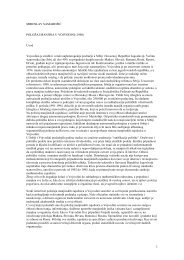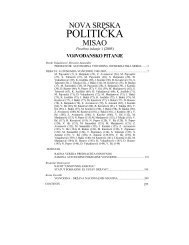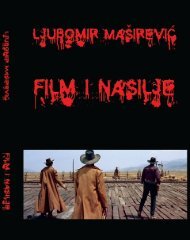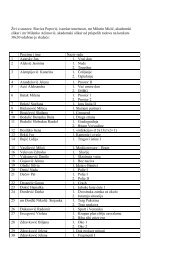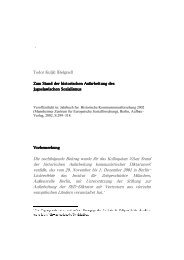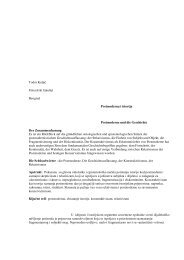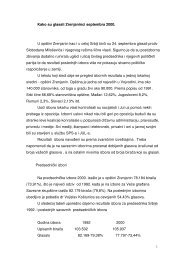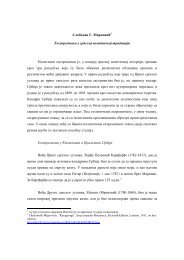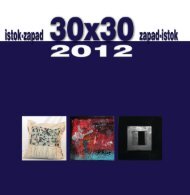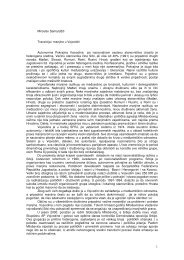Todor Kuljić TITO -sociološkoistorijska studija- (Drugo ... - Početak
Todor Kuljić TITO -sociološkoistorijska studija- (Drugo ... - Početak
Todor Kuljić TITO -sociološkoistorijska studija- (Drugo ... - Početak
You also want an ePaper? Increase the reach of your titles
YUMPU automatically turns print PDFs into web optimized ePapers that Google loves.
SUMMARY<br />
Tito - a sociological-historical study<br />
This study is a sociological-historical research into the political culture,ideology and<br />
organization of Titos rule. The regime in question was set up on the one-party, yet complex<br />
multi-national system and multi-layer pattern of integration. In this framework Tito as leader<br />
played the part of an extraordinary active, energetic, and prominent linking element, remarkable<br />
for the domineering components of personal authority. However no matter how personal, a rule<br />
has never been determined just by the activities and will of leader alone. Even the most<br />
influential figured had to face insurmountable limits set by their own time, pre-conditioned by<br />
ideological horizont of the epoch, or by the power of tradition. Mentioned structures were<br />
analytically examined in this study in order to more clearly define the autonomy of influential<br />
figures. Also a rather neglected side of the Yugoslav socialism was investigated: its relative<br />
place in long-term historical processes, Titos role, and basic patterns of political culture. Titos<br />
role in short and long-term processes in the Balkans was studied from a perspective of history<br />
understanding developed on the marxist line of thinking combined with F. Braudels school and<br />
german structural-historic stream (Kocka, Wehler). In the first plan are not events than<br />
processes.<br />
Tito is the heart of current concern with memory of Yugoslav socialism. Who ever says<br />
communism, says Tito. Tito has been crucial symbol in the shift from a “history of the victor”<br />
or, in Nietzsche’s terms, monumental communist history to a history of the Tito’s victims.<br />
From the hero Tito becomes antihero. This book is written as a critic of the monumental<br />
communist history but also as a critic of a new “monumental antitito’s history” . The cult of<br />
Tito in the communist official memory is today replaced with the new politics of victimisation,<br />
where Tito is central enemy. This is a kind of a new memory of power also with the absolute<br />
moral claims, especially in the last Yugoslav war.<br />
Chapter 1. summarizes the settings in which one-party regimes in the contemporary world acted<br />
as the agents of modernization. Tradition imposed to this specific modernization a truncated<br />
and authoritarian form. On the Balkans, a solution for the ethnic question was a condition not<br />
only for the development of society, but for its survival as well. Burneded by a tradition of<br />
ethnic conflicts, the national sentiment is easily politised, taking hold of the root of the being<br />
during social crises, because it is connected to survival and basic existential interests. The role<br />
of a ruler in a multhiethic state burdened by militant, uncompromising ethic mentality is<br />
unusually complex, so a reliable judgment of his histortical achievement must be differentiated<br />
from the function of his cult. It was broader discussed in the first Chapter “The authoritarian<br />
Modernization”. The second Chapter, entitled “Tradition-related components of Balkan<br />
Charismatic leader”, discusses the main patterns of the Balkan liberation political culture in<br />
which leaders idea had a pivotal integrating role. In the permanently insecure and war-state<br />
background, a leader in the Balkan was a tested warrior who laid claims to unrestricted<br />
authority on the ground of his recognized merits in liberation efforts. As regards political<br />
culture, the Balkan – content- weise distinct – monarchy and republican regimes of personal<br />
power can be more or less indirectly derived from this basic leader-liberator model. This was<br />
demonstrated in the Chapter 3. by a diachronic comparison of Prince Miloš (1783-1860),<br />
Nikola Pašić (1845-1926), and Tito (1892-1980), the key political figures of Serbia and<br />
Yugoslavia of the 19 th and 20 th century. Though they championed distinct class and national<br />
visions of desired society, an element which these rulers had in common was the similar<br />
political tradition and culture. Chapter 4. exposes a critical assessment of Titos role in the<br />
period before his coming to power (1937-1945), given from the standpoint of structural history.<br />
It also discussed the impact of national and class structures on Titos behavior (a vision o a<br />
federation void of a leading nation and the Bolshevic culture), but also alternating degreee of<br />
his independence in the periods of underground activity and war ( Tito as a party leader, army<br />
leader, and a diplomat). Chapter 5, entitled “Tito and political Culture of Bolshevism”,<br />
226



